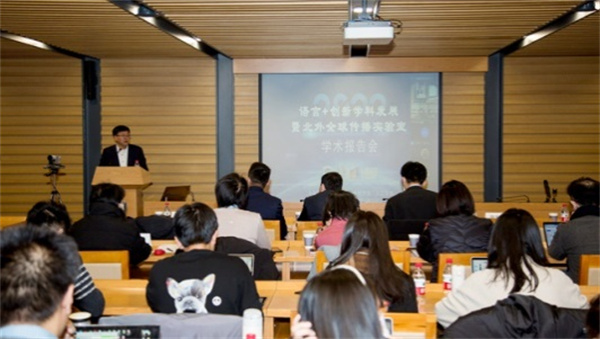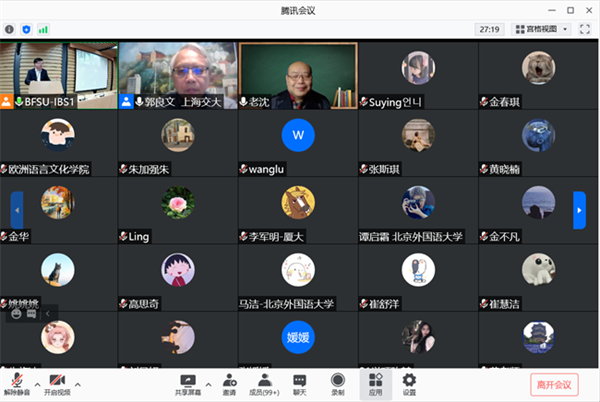- Research
- Research Centers
- Journals
- Admission
- Introduction
- Programs
- Application
- Alumni & Giving
- Alumni Club
- Giving
The Academy of Regional and Global Governance, the School of International Journalism and Communication and the International Business School (IBS) of Beijing Foreign Studies University (BFSU) hosted an academic conference on language, innovative discipline development and global communication on Jan 11.
Themed on disciplinary integration, global communication and artificial intelligence, the conference attracted more than 200 online and offline participants.
Representatives from Shanghai Jiao Tong University (SJTU), BFSU and Yueke Education & Technology Company delivered keynote speeches on promoting scientific research and language-based disciplinary development with the aid of big data and school-wide media platforms. They also discussed the operation of the global communication laboratory at BFSU.

BFSU holds an academic conference on language, innovative discipline development and global communication on Jan 11. [Photo provided to bfsu.edu.cn]
Zhao Gang, a member of the standing committee of the CPC BFSU committee and vice-president of the university, expounded on the functions and significance of the global communication laboratory. He said he hopes BFSUers will yield more innovative academic achievements with this supportive platform.

Representatives from SJTU, BFSU and Yueke Education & Technology Company deliver keynote speeches at the conference on Jan 11. [Photo provided to bfsu.edu.cn]
Guo Liangwen, a professor from the School of Media and Communication (SMC) at SJTU, reported on the in-depth integration of technologies and culture. He suggested building digital archives and intelligent platforms to introduce China’s intangible cultural heritage to the world.
Shen Huizhang, a professor from the Department of Information, Technology and Innovation at the Antai College of Economics and Management of SJTU, elaborated on the definitions of artificial intelligence, neural networks, computer science and big data.
Xu Jiajin, deputy director of the National Research Centre for Foreign Language Education and director of the Research Center for Multilingual Corpus at the BFSU Artificial Intelligence and Human Languages Lab (BFSU•AI), delivered a report titled Humanities and Social Sciences Research Based on Corpus Linguistics.
Yu Weihua, a research fellow from the SMC at SJTU, illustrated the objects of humanities and social sciences research with the application of new technologies and the relationship between big data and liberal arts. He also analyzed the connotations, value and construction of multilingual big data, as well as the positioning of a multilingual big data platform.
Li Zuowen, director of BFSU•AI, expounded on artificial intelligence, the relationship between language and intelligence, machines’ understanding of language and disciplinary connotations of language intelligence.
Fu Wei, CEO of Yueke Education & Technology Company, talked about the establishment of a financial dictionary and textual big data, as well as digitalization in the financial sector.
Zhou Xinyu, deputy director and secretary-general of the Center for Public Diplomacy Studies at BFSU, lectured on the construction, staff allocation, scope of services and mechanization of the university’s global think tank.
Niu Xiaojia, director of the systems engineering team at the T-Lab of SJTU, explained the design and development of the global communication laboratory at BFSU, and described the major functions, characteristics, data sources, data structure and framework of the multilingual big data platform.
Xia Xiaoxue, a postdoc at BFSU, shared her studies on the connection between the characteristics of language structure, finance and economics, as well as the cross-disciplinary research in this field.
Niu Huayong, dean of the IBS, thanked experts for their reports and introduced the basic situation of the global communication laboratory, adding that the laboratory will support relevant institutions and research fellows at BFSU by developing functions including the classification, capture and analysis of global media data.